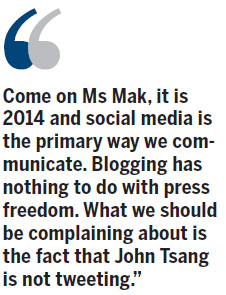Everyone communicates via social media now
Updated: 2014-07-08 06:36
By Lau Nai-keung(HK Edition)
|
|||||||
The US Supreme Court has recently ruled that corporations also have freedom of religion. This is strange, but it is the essence of the Hobby Lobby case.
The controversy started with the US Affordable Care Act, which stipulates that employers need to provide healthcare for their employees, and this should cover all forms of contraception - at no cost. However, some corporations have insisted they should not have to pay for all of these services - especially those which conflict with their beliefs.

The owners of Hobby Lobby Stores, Inc, an Oklahoma-based arts-and-crafts retailer, refused to offer insurance that covers emergency contraceptives. This is because they claim their "religious beliefs prohibit them from providing health coverage for contraceptive drugs and devices that end human life after conception". Citing the US Religious Freedom Restoration Act (RFRA), a federal law passed in 1993 which says the "government shall not substantially burden a person's exercise of religion even if the burden results from a rule of general applicability." Hobby Lobby is taking the US government to court to obtain a ruling on whether for-profit companies have a right to exercise religious freedom and if they do, whether or not the government has a compelling interest in overriding it in this particular case.
Five judges of the US Supreme Court ruled that closely held for-profit businesses, those with at least 50 percent of stock held by five or fewer people, such as family-owned businesses, have the same right of religious liberty, as do individuals. "The companies in the cases before us are closely held corporations, each owned and controlled by members of a single family, and no one has disputed the sincerity of their religious beliefs," Justice Samuel Alito wrote in the majority opinion. "The plain terms of the RFRA make it perfectly clear that Congress did not discriminate in this way against men and women who wish to run their businesses as for-profit corporations in the manner required by their religious beliefs." Four other judges of the same court dissented.
President Barack Obama commented on the controversial Hobby Lobby decision using the social media platform, Twitter. The verified @BarackObama account tweeted "Throwback to last week when a woman - not her boss - made her own decisions about her healthcare. #TBT," along with a picture of a mock ad with the words "Talk to your boss about birth control and find out if it's right for you." The tweet had around 25,000 retweets and nearly 20,000 favorites.

You have likely seen hashtags everywhere these days. Many social sites use hashtags to create instant connections among users. When a user uses hashtags to find a particular word, they will see all posts containing the hashtagged word. Social media users typically use #TBT, which stands for Throwback Thursday, to label lighthearted, fun pictures of themselves from several years ago.
While some may be annoyed by Obama's misuse of the #TBT hashtag to discuss serious issues, others complain about the idea of a US president communicating with the public through Twitter. "Obama's legacy? How about the #TwitterPresident? Surely the pint-sized messaging service is a perfect vehicle for promoting the undernourished programs of the #ObamaWhiteHouse. How better to convey Obama's meaningless foreign policy 'doctrine' than summing it up in 140 characters (or less!)?" Liz Peek of the Fiscal Times wrote earlier this year.
In Hong Kong, the Journalists Association has recently released its annual report entitled "Press Freedom under Siege". The report begins with the assertion that "The year under review has been the darkest for press freedom for several decades." Few would be likely to read past the report's first sentence, as the association's brand of alarmism is getting boring. In fact, without reading the association's report, I am confident that my piece "Self-censorship or just office politics?" published here in February has already addressed most of these accusations.
The annual report was released during the association's press conference. Mak Yin-ting, former chairwoman of the association who is now with its "press freedom subcommittee," criticized officials such as Financial Secretary John Tsang Chun-wah for using blogs to release information.
Come on Ms Mak, it is 2014 and social media is the primary way we communicate. Blogging has nothing to do with press freedom. What we should be complaining about is the fact that John Tsang is not tweeting.
The author is a veteran current affairs commentator.
(HK Edition 07/08/2014 page9)